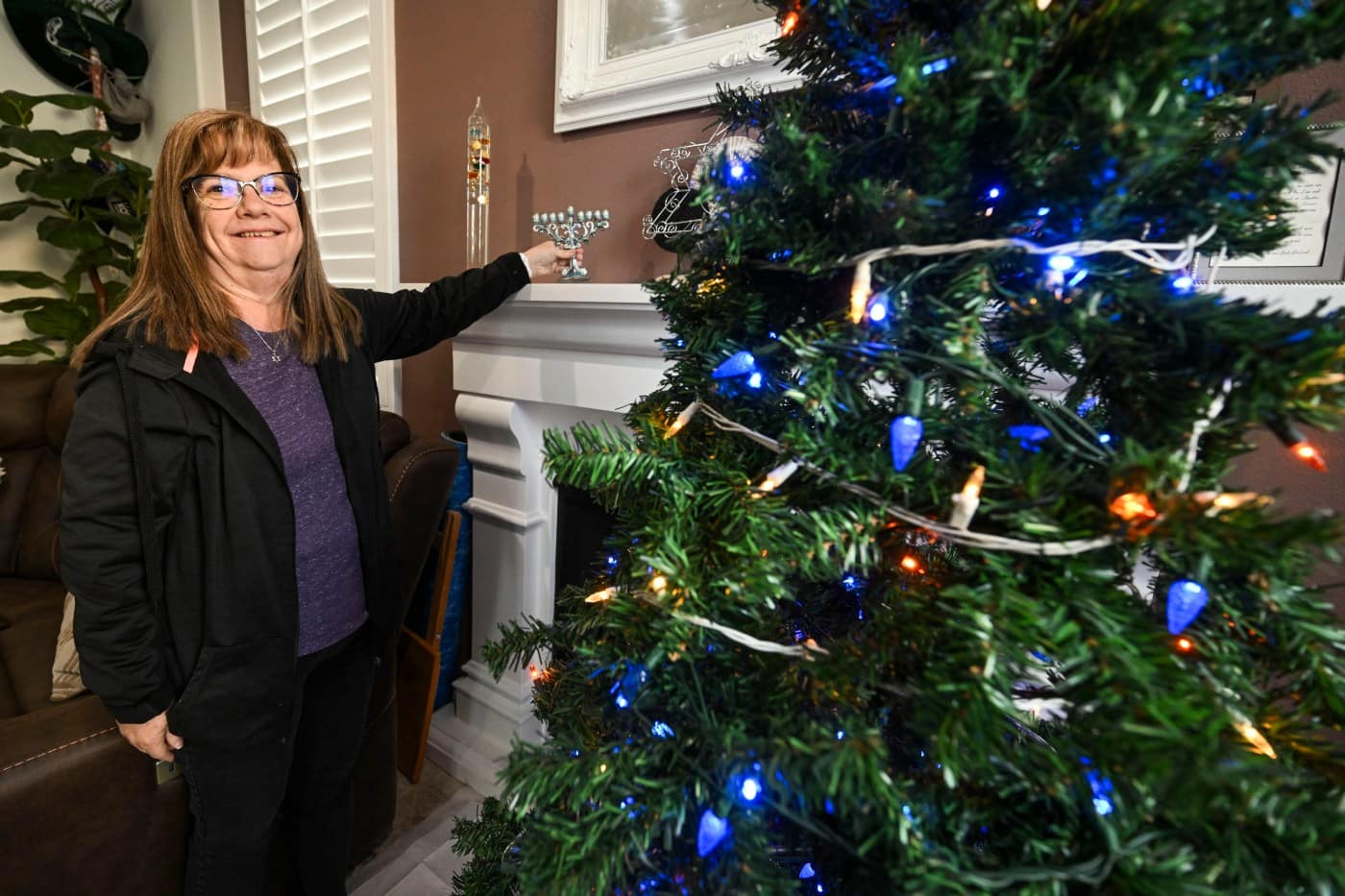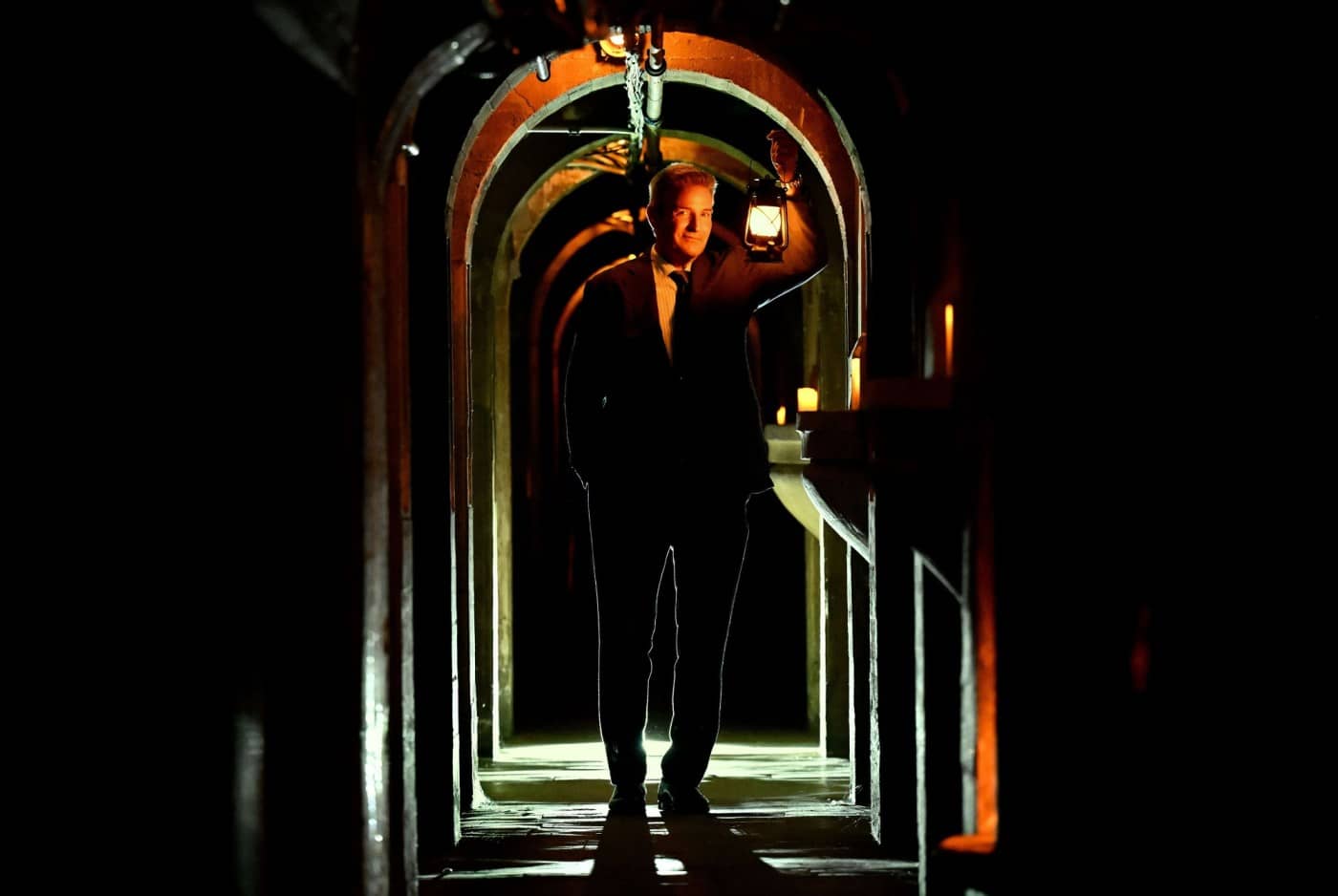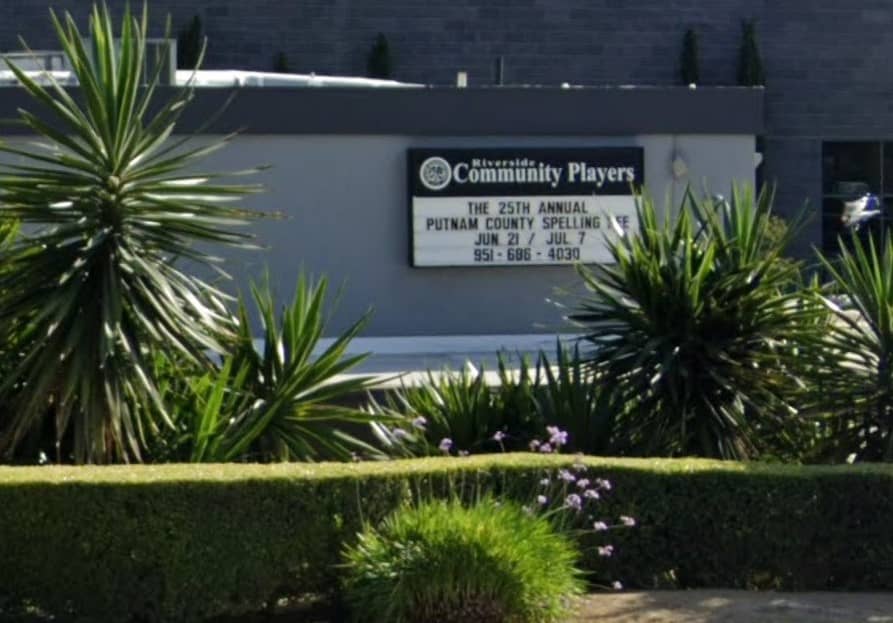For most Jewish people, Dec. 25 is just another day.
Not this year.
Christmas Day — Wednesday, Dec. 25 — also is the start of Hanukkah, something that hasn’t happened since 2005 and only occurs every 20 to 30 years. It won’t happen again until 2035.
Across Southern California, interfaith families — those made up of different faiths — have found various ways of celebrating one or both religious holidays, sometimes mixing traditions like displaying a nativity set and lighting a menorah. This year, this blending of the holidays called “Chrismukkah” is giving some mixed-faith families two holidays to celebrate in one day, along with some challenges and opportunities.
Christians, Catholics and Buddhists celebrate Christmas to mark Jesus Christ’s birth, when three wise men traveled to deliver gifts to him in a stable in Bethlehem. Hanukkah — referred to more traditionally as Chanukkah — is an eight-day-long Jewish holiday.
Hanukkah traditions include lighting a candle each day on a menorah, which Jory Yarmoff, president of Temple Beth El in Riverside, said was originally done with oil candles but now usually uses with wax candles.
Because Hanukkah and other Jewish holidays are based on the Jewish calendar, which is lunar, the calendar determines when Hanukkah starts, Yarmoff said.
“It’s not that uncommon that some part of Hanukkah will overlap with Christmas because Hanukkah is eight days,” he said. “It is unusual that it actually is starting on Christmas.”
Because the holiday centers around oil candles, food made with oil is supposed to be eaten during Hanukkah. Latkes, a potato pancake, and sufganiyah — a round jelly-filled donut — are the most popular dishes, Yarmoff said.
While there is no religious significance of the two holidays falling on the same day, it can be symbolic, said Rabbi Becky Hoffman of Temple Ahavat Shalom in Northridge.
“The idea of light and the light that we all share has significance in us broadening how we think about our world and questioning our points of view, as well as looking for more links of connection,” Hoffman said. “There’s a common theme in families coming together, hoping for goodness and finding connections between humanity.”
Rabbi Reuven Mintz, who leads the Chabad Center for Jewish Life in Newport Beach, called the double holiday an opportunity to “bring even more love and happiness into the world.”
At the Chabad, which overlooks Newport Bay, festivities on Wednesday, Dec. 25, will include a menorah lighting and a concert with a group from Israel. Members of the Chabad will also visit local senior living homes and help residents there — Jewish and non-Jewish — celebrate the holidays.
John Wayne Airport in Santa Ana will display a giant menorah for the first time ever, Mintz said, and in Newport Beach, there are at least a dozen displayed throughout the community.
Temple Beth El in Riverside is a reform Jewish congregation, which Yarmoff described as “the liberal side of Judaism.” For example, the temple accepts and honors members and marriages of mixed-faith families. Typically, Orthodox Jewish people only marry other Jewish people.
Because the synagogue is reform, Yarmoff said many in its congregation are mixed-faith families. Still, he emphasized that families celebrate differently and that some mixed-faith families with Jewish people may mark both holidays.
“There are some Jews that would think celebrating Hanukkah and Christmas is a bad thing and there are some that think it’s wonderful to have a couple of holidays to celebrate,” Yarmoff, 67, said.
One of Yarmoff’s cousins, who is Jewish, hosts an annual Christmas party without religious imagery or traditions, he said.
One benefit of having both holidays on the same day is that traveling is easier. Sometimes Hanukkah is at the beginning of December, which makes it harder for mixed-faith families to celebrate both together.
One mixed-faith family that attends the Riverside synagogue is that of Riverside resident Sheri Cruz, a Jewish woman who married a Catholic husband.
Cruz grew up Jewish but said her family didn’t commemorate many traditional Jewish holidays such as Rosh Hashanah and Yom Kippur.
“We weren’t temple members, I didn’t have a bat mitzvah, the only thing that my parents really taught me was that we were not Christian,” Cruz, 58, said.
Though her husband, John Cruz, is an active Catholic parishioner whose mother taught catechism, he agreed to raising their children Jewish.
“I wanted my kids to have some kind of a religious background, and if they chose not to continue with Judaism, that was OK, as long as they had some kind of a basis for making a decision,” she said. “All three of my children still practice in their 20s and I’m so happy about that.”
When Cruz’s kids were younger, they had a Christmas tree about six years even as she went all out for Hanukkah. She was extra thoughtful in coordinating their gifts and making it the special religious holiday she didn’t get as a kid. The family visited her husband’s side on Christmas Eve or Christmas Day, so all of her children grew up with both holidays.
While Cruz’s husband never converted to Judaism, she said he was active in the temple, even helping take photos for bar and bat mitzvahs.
The two holidays on the same day will be tricky for her this year since most of the family celebrates Christmas, especially since her kids — now 28, 24 and 20 — spend time with their mixed-faith partners.
“Navigating around Christmas has always been a hard part for me because Hanukkah is not a national holiday and fluctuates, so it’s really hard to get people together around that time,” she said, adding that the family’s big Hanukkah celebration is waiting until Jan. 11 this year.
For the past few years, Christmas Eve and Christmas Day have been lonely times for her because her husband is in an assisted living center. This year, the temple will do a first day of Hanukkah celebration Wednesday, Dec. 25, at which the first menorah candle will be lit, Hanukkah songs will be sung and Chinese food will be served.
“I’m usually just at home by myself while everyone has something to do so it’ll be nice this year to be with Jewish people at my temple,” said Cruz, whose home includes a Christmas tree with blue Hanukkah lights, alongside a few menorahs.
Author Amanda Frances, a Christian with a Jewish fiancé who splits time between Newport Beach and Bel Air, said this year’s double holiday is “certainly an interesting challenge.” But she, her fiancé and their four children are excited about it.
“It’s honestly a beautiful feeling to celebrate both holidays in one day,” Frances, 39, said. “It’s a chance to reflect on the core values of both religions — love, hope, faith, family and light. It might seem like a lot to some, but for us, it’s the norm, and we’ve grown to appreciate the balance. We also see it as an opportunity to teach our children about respect, inclusion and celebration across faiths, which we believe is invaluable.”
“Both Eddie and I value our faiths deeply, and we’ve embraced the beautiful complexity of raising our children in both traditions,” Frances said. “For us, it’s not about choosing one faith over the other, but about making space for both to coexist.”
This year, their family plans to start Christmas morning by spending time together, praying and exchanging gifts. Later in the day, they’ll light the menorah, say blessings, sing, eat and play with a dreidel.
“It’s shaping up to be a ‘Chrismukkah’ day, blending both holidays with an extra sense of togetherness,” Frances said.
In the past, the couple has hosted mid-December “Chrismukkah” parties with friends of all faith backgrounds and has learned to merge traditions.
“Our interfaith journey isn’t a challenge so much as it is a gift — one that enriches our lives and deepens our understanding of family, faith, and culture,” she said.
Staff writers Arianna Clay and Erika I. Ritchie contributed to this report.


















